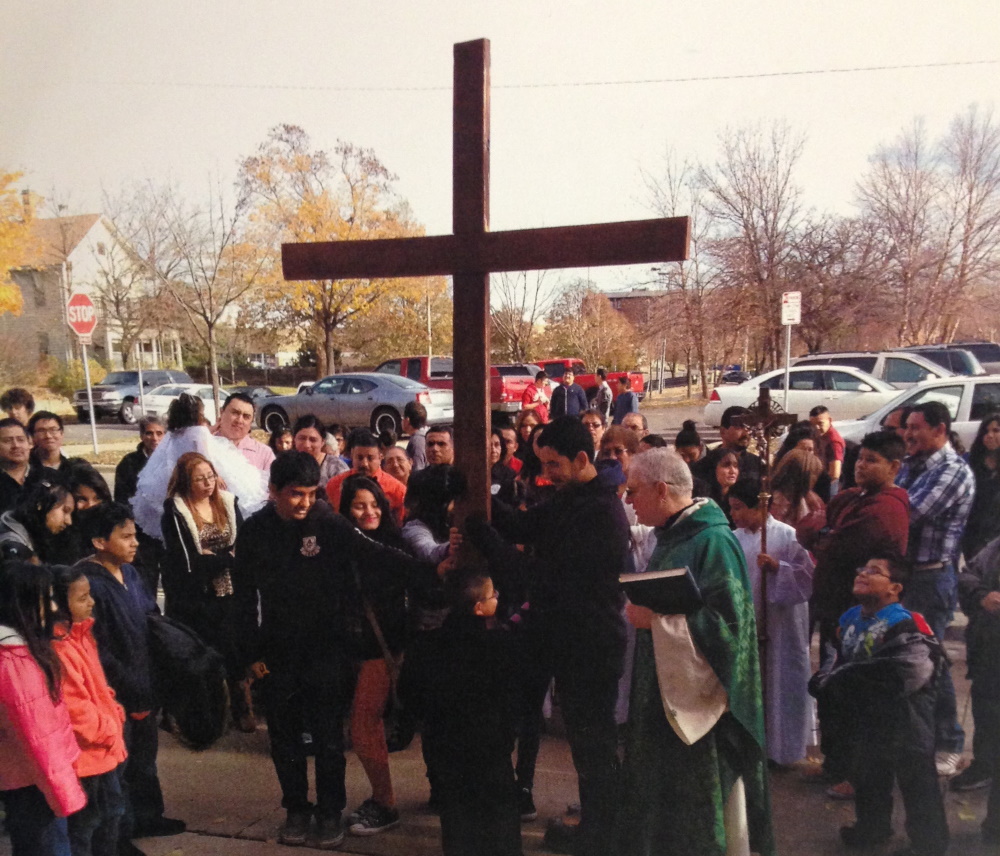 One thing a lot of people may not know about the Rite of Christian Initiation of Adults is that it includes a rite that is not a rite of initiation. There were two important reform movements that let up to the Second Vatican Council in the 1960s. One was the liturgical movement. The restoration of the catechumenate came out of that movement and is called for in the Constitution on the Sacred Liturgy.
One thing a lot of people may not know about the Rite of Christian Initiation of Adults is that it includes a rite that is not a rite of initiation. There were two important reform movements that let up to the Second Vatican Council in the 1960s. One was the liturgical movement. The restoration of the catechumenate came out of that movement and is called for in the Constitution on the Sacred Liturgy.
The other reform was generated by the ecumenical movement. I learned about the ecumenical movement when I was in college about a decade after Vatican II concluded. I remember being shocked to learn that we Catholics used to refer to other Christians as heretics or schismatics.
It used to be that Christians who wanted to become Catholic would do so by celebrating a rite originally intended to reconcile heretics and apostates to the church. And, just to be sure, they would usually be conditionally baptized.
Happily, during the early part of the 20th century, that changed.
Greater unity in the church
All the major Christian churches, including the Catholic Church, engaged in serious ecumenical dialogue that led to deeper mutual respect for each other’s’ traditions and some tentative steps toward greater unity. That dialogue continues today.
One of the really great outcomes of the ecumenical movement is the Rite of Reception into the Full Communion of the Catholic Church. There is nothing in the rite that mentions reconciliation of heretics. Nor is there any hint of baptism. The church’s stance against conditional baptism of other validly-baptized Christians is very strong. The rite is intended to be a simple reception of a brother or sister in Christ into full communion of the Catholic Church. The rite says:
The rite is so arranged that no greater burden than necessary (see Acts 15:28) is required for the establishment of communion and unity. (RCIA 473)
Another very important aspect of this rite is that the Christian is received into full communion, meaning that by their baptism they are already in partial communion. Because the Christian is already in partial communion with us, we need to discern with them the best way for them to prepare both spiritually and doctrinally to celebrate their reception into full communion. That preparation needs to be “adapted to individual pastoral requirements” (RCIA 476). A single, one-size-fits-all program will not do.
This means especially that the baptized candidates for reception into full communion do not participate in the catechumenate because the catechumenate is for those being initiated into Christ. Baptized candidates are already initiated. Therefore the rite says:
Anything that would equate candidates for reception with those who are catechumens is to be absolutely avoided. (RCIA 477)
When some parish teams hear this, they begin to worry that the will have to design two separate formation process and have two separate formation teams — one for the catechumens and one for the baptized candidates. That may not necessarily be the case.
Preparing candidates in your parish
For baptized candidates who already have a relationship with Jesus Christ and who are already living as Christians, they will need a much shorter, less intense preparation process than the catechumens. So you can discern with the candidates what aspects of the catechumenate formation will be helpful in each candidate’s faith journey. Once you have an idea of what that is for each candidate, they can participate with the catechumens in just those parts of the formation process that are appropriate for them.
In other words, you don’t necessarily need two separate processes; you just need to pare down the elements of catechumenal formation that are not necessary for faithful Christians to participate in. The rite of reception expects this will happen:
The baptized Christian is to receive both doctrinal and spiritual preparation, adapted to individual pastoral requirements…. (RCIA 477; emphasis added)
As part of their individual adaptation, a very specific subset of the baptized candidates “may benefit from the celebration of liturgical rites marking their progress in formation” (RCIA 478). The rite suggests that these liturgical rites might include one or several of the rites in Part II of the Rite of Christian Initiation of Adults, “Preparation of Uncatechized Adults for Confirmation and Eucharist.” However, note that those rites may only be used with candidates “who were baptized as infants…but did not receive further catechetical formation nor, consequently, the sacraments of confirmation and eucharist” (RCIA 400).
Frequently, parish teams will celebrate these rites with all of the baptized candidates, even if they already have had some Christian formation. That is not what the church intends for the use of these rites.
Initiating candidates
So what liturgical rites can we celebrate with baptized Candidates who have had some previous formation and wish to mark their progress in formation?
- There are many blessings in the Book of Blessings that would be wonderful to use.
- If the candidate is married, they could celebrate a renewal of wedding vows, marking progress toward the day when husband and wife will be fully united in faith.
- Baptized candidates can celebrate the sacrament of reconciliation.
- They can also participate in the sarcramentals of the church by making use of holy water, holy medals, the rosary, blessed salt, crucifixes, and candles.
- They can also mark their progress through regular prayer in their domestic church such as morning and night prayer and praying the Lord’s Prayer at noon every day.
- And, of course, their full, conscious, and active participation in the Sunday assembly would be the premier way in which they would mark their spiritual progress.
These very Catholic practices would ground baptized candidates deeply in the Catholic tradition of liturgy and prayer and would go a long way toward recognizing that their baptism in Jesus Christ makes them members of the baptismal priesthood just as it does for us.
Your turn
What has the preparation of baptized candidates looked like in your parish? How are the rites celebrated with them? Share your thoughts in the comments below.











Yes, pastorally appropriate for each individual is a key. One thing to watch for, however, is the amount of necessary Catholic focused Catechesis really required for each individual. Even a well taught Protestant must “unlearn” much of their training. In fact, that relearning can be more important than dealing with an new Catechumen. Especially of concern is the focus on the Sacraments during the Period of the Catechumen. Need that for sur
Hi Bruce. Thanks for sharing your thoughts. All the best,
Nick
Hi Dianne you mention baptized Christians who already have a relationship with Christ but my experience has been that many were baptized as babies but have never lived a faith I dont think we should assume just because they were baptized they are practising Christians so even though they dont need baptism they do need to get to know Christ exactly as an unbaptised person with no knowledge of Christ
Hi Beverley. You are absolutely right. If someone is baptized as an infant and has never lived the faith, they will need a formation process that is similar to the catechumens.
My point in this post is that in many places, active Christians are sometimes treated as though they are just now coming to faith. And they are required to participate in a full catechumenal formation, which is unnecessary and even detrimental for them.
Even so, I really appreciate your reminder that we have to give extra attention to Christians who do not have an active relationship with Jesus. Thanks for chiming in.